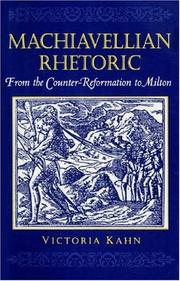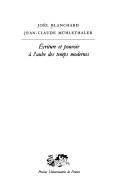| Listing 1 - 10 of 20 | << page >> |
Sort by
|
Book
ISBN: 9051707363 Year: 2003 Publisher: Amsterdam Rozenberg
Abstract | Keywords | Export | Availability | Bookmark
 Loading...
Loading...Choose an application
- Reference Manager
- EndNote
- RefWorks (Direct export to RefWorks)
Literature and politics --- Literature--Political aspects --- Literatuur en politiek --- Literatuur--Politieke aspecten --- Littérature et politique --- Littérature--Aspects politiques --- Politics and literature --- Politiek en literatuur --- Politique et littérature --- Philosophy and psychology of culture --- Literature --- History and criticism

ISBN: 2745306413 9782745306418 Year: 2002 Volume: 9 Publisher: Paris Champion
Abstract | Keywords | Export | Availability | Bookmark
 Loading...
Loading...Choose an application
- Reference Manager
- EndNote
- RefWorks (Direct export to RefWorks)
Rousseau, Jean-Jacques --- Literature and politics --- Literature--Political aspects --- Literatuur en politiek --- Literatuur--Politieke aspecten --- Littérature et politique --- Littérature--Aspects politiques --- Politics and literature --- Politiek en literatuur --- Politique et littérature --- Rousseau, Jean-Jacques, --- Criticism and interpretation --- Appreciation --- Literature --- Philosophy --- French literature --- 18th century --- History and criticism --- Rousseau, Jean-Jacques, - 1712-1778

ISBN: 0631172718 0631172696 Year: 1990 Volume: vol *3 Publisher: Oxford Cambridge, Mass. Blackwell
Abstract | Keywords | Export | Availability | Bookmark
 Loading...
Loading...Choose an application
- Reference Manager
- EndNote
- RefWorks (Direct export to RefWorks)
Literature and politics --- Literature--Political aspects --- Literatuur en politiek --- Literatuur--Politieke aspecten --- Littérature et politique --- Littérature--Aspects politiques --- Politics and literature --- Politiek en literatuur --- Politique et littérature --- Criticism --- Literature --- Critique --- Littérature --- History --- History and criticism --- Theory, etc --- Histoire --- Histoire et critique --- Théorie, etc --- Politics and literature. --- Theory, etc. --- Littérature --- Politique et littérature --- Théorie, etc --- 20th century

ISBN: 0791425460 Year: 1995 Volume: *2 Publisher: Albany, NY : State University of New York [SUNY] Press,
Abstract | Keywords | Export | Availability | Bookmark
 Loading...
Loading...Choose an application
- Reference Manager
- EndNote
- RefWorks (Direct export to RefWorks)
Literature and politics --- Literature--Political aspects --- Literatuur en politiek --- Literatuur--Politieke aspecten --- Littérature et politique --- Littérature--Aspects politiques --- Politics and literature --- Politiek en literatuur --- Politique et littérature --- Women in literature --- History --- European literature --- 1450-1600 (Renaissance) --- History and criticism --- Women --- Europe --- FEMMES --- EUROPE --- RENAISSANCE --- FEMMES EN POLITIQUE --- VIE POLITIQUE --- VIE INTELLECTUELLE --- CIVILISATION --- 14E-16E SIECLES --- HISTOIRE --- 15E SIECLE --- 15E-16E SIECLES --- Vie intellectuelle

Abstract | Keywords | Export | Availability | Bookmark
 Loading...
Loading...Choose an application
- Reference Manager
- EndNote
- RefWorks (Direct export to RefWorks)
Literature and politics --- Literature--Political aspects --- Literatuur en politiek --- Literatuur--Politieke aspecten --- Littérature et politique --- Littérature--Aspects politiques --- Politics and literature --- Politiek en literatuur --- Politique et littérature --- Surrealism (Literature) --- Surrealisme (Literatuur) --- Surréalisme (Littérature) --- Surrealism in literature --- Literature --- Political aspects --- Breton, André, --- Бретон, Андре, --- Criticism and interpretation. --- Breton, André --- Criticism and interpretation --- Breton, André --- Бретон, Андре

ISBN: 0472066714 Year: 1998 Volume: *13 Publisher: Ann Arbor University of Michigan Press
Abstract | Keywords | Export | Availability | Bookmark
 Loading...
Loading...Choose an application
- Reference Manager
- EndNote
- RefWorks (Direct export to RefWorks)
Bread and Puppet Theatre --- Literature and politics --- Literature--Political aspects --- Literatuur en politiek --- Literatuur--Politieke aspecten --- Littérature et politique --- Littérature--Aspects politiques --- Politics and literature --- Politiek en literatuur --- Politique et littérature --- Theater --- Political aspects. --- Political aspects --- Merriam, Eve --- Fornes, Maria Irene --- Dramatic production --- Parks, Suzan-Lori --- Martin, Jane --- Political plays [American ] --- History and criticism

ISBN: 1400821282 1400812259 0691034915 9781400812257 9780691034911 9781400821280 Year: 1994 Publisher: Princeton, N.J. Princeton University Press
Abstract | Keywords | Export | Availability | Bookmark
 Loading...
Loading...Choose an application
- Reference Manager
- EndNote
- RefWorks (Direct export to RefWorks)
Historians of political thought have argued that the real Machiavelli is the republican thinker and theorist of civic virtù. Machiavellian Rhetoric argues in contrast that Renaissance readers were right to see Machiavelli as a Machiavel, a figure of force and fraud, rhetorical cunning and deception. Taking the rhetorical Machiavel as a point of departure, Victoria Kahn argues that this figure is not simply the result of a naïve misreading of Machiavelli but is attuned to the rhetorical dimension of his political theory in a way that later thematic readings of Machiavelli are not. Her aim is to provide a revised history of Renaissance Machiavellism, particularly in England: one that sees the Machiavel and the republican as equally valid--and related--readings of Machiavelli's work. In this revised history, Machiavelli offers a rhetoric for dealing with the realm of de facto political power, rather than a political theory with a coherent thematic content; and Renaissance Machiavellism includes a variety of rhetorically sophisticated appreciations and appropriations of Machiavelli's own rhetorical approach to politics. Part I offers readings of The Prince, The Discourses, and Counter-Reformation responses to Machiavelli. Part II discusses the reception of Machiavelli in sixteenth-and seventeenth-century England. Part III focuses on Milton, especially Areopagitica, Comus, and Paradise Lost.
Rhetoric --- Politics and literature. --- History. --- Machiavelli, Niccolò, --- Political and social views. --- Criticism and interpretation. --- Literature and politics --- Literature--Political aspects --- Literatuur en politiek --- Literatuur--Politieke aspecten --- Littérature et politique --- Littérature--Aspects politiques --- Politics and literature --- Politiek en literatuur --- Politique et littérature --- Italian literature --- Literary rhetorics --- Machiavelli, Niccolò --- Literature --- Political aspects --- 1500-1800 --- Machiavelli, Niccolo --- Political and social views --- Criticism and interpretation --- Rhetoric - 1500-1800. --- マキアヴェルリ --- Machiavelli, Niccolo,

ISBN: 2130523986 9782130523987 Year: 2002 Volume: *25 Publisher: Paris PUF
Abstract | Keywords | Export | Availability | Bookmark
 Loading...
Loading...Choose an application
- Reference Manager
- EndNote
- RefWorks (Direct export to RefWorks)
French literature --- Literature and politics --- Literature--Political aspects --- Literatuur en politiek --- Literatuur--Politieke aspecten --- Littérature et politique --- Littérature--Aspects politiques --- Macht (Filosofie) in de literatuur --- Politics and literature --- Politiek en literatuur --- Politique et littérature --- Pouvoir (Philosophie) dans la littérature --- Power (Philosophy) in literature --- European literature --- Literature, Medieval --- Littérature européenne --- Pouvoir (Morale) dans la littérature --- Littérature médiévale --- History and criticism --- Histoire et critique --- Medieval literature --- History and criticism. --- -Power (Philosophy) in literature --- Power (Philosophy) in literature. --- Littérature européenne --- Pouvoir (Morale) dans la littérature --- Littérature médiévale --- Politique et littérature --- 1450-1600 (Renaissance) --- French literature - History and criticism - To 1500 --- -Medieval literature - History and criticism.
Book
ISBN: 0877226083 Year: 1989 Publisher: Philadelphia, Pa Temple University Press
Abstract | Keywords | Export | Availability | Bookmark
 Loading...
Loading...Choose an application
- Reference Manager
- EndNote
- RefWorks (Direct export to RefWorks)
Fiction --- Sociology of literature --- Thematology --- Morrison, Toni --- Walker, Alice --- Bambara, T. --- Literature and politics --- Literature--Political aspects --- Literatuur en politiek --- Literatuur--Politieke aspecten --- Littérature et politique --- Littérature--Aspects politiques --- Politics and literature --- Politiek en literatuur --- Politique et littérature --- Race dans la littérature --- Race in literature --- Ras in de literatuur --- Seksualiteit in de literatuur --- Semiotics and literature --- Semiotiek en literatuur --- Semiotique et litterature --- Sex in literature --- Sexe dans la littérature --- American fiction --- African American authors --- History and criticism --- Women authors --- 20th century --- Bambara, Toni Cade --- Political and social views --- Walker, Alice, 1944 --- -Political and social views --- Bambara (toni cade), 1939-1995 --- Walker (alice)
Book
ISBN: 0226864960 0226864952 Year: 1987 Publisher: Chicago, Ill. University of Chicago Press
Abstract | Keywords | Export | Availability | Bookmark
 Loading...
Loading...Choose an application
- Reference Manager
- EndNote
- RefWorks (Direct export to RefWorks)
Political philosophy. Social philosophy --- English literature --- Thematology --- anno 1800-1999 --- anno 1600-1699 --- anno 1500-1599 --- Literature and politics --- Literature--Political aspects --- Literatuur en politiek --- Literatuur--Politieke aspecten --- Littérature et politique --- Littérature--Aspects politiques --- Politics and literature --- Politics in literature --- Politiek en literatuur --- Politiek in de literatuur --- Politique dans la littérature --- Politique et littérature --- Poetry --- Poets --- Politics and literature. --- Politics in literature. --- History and criticism. --- Political and social views. --- History and criticism --- Political and social views --- Poetry - History and criticism. --- Poets - Political and social views.
| Listing 1 - 10 of 20 | << page >> |
Sort by
|

 Search
Search Feedback
Feedback About UniCat
About UniCat  Help
Help News
News